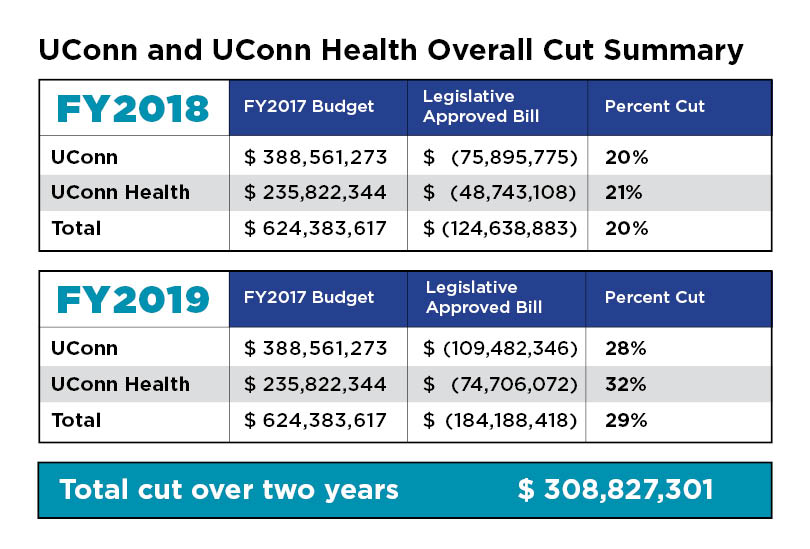The budget approved last week by the General Assembly would reduce the state appropriation to the University of Connecticut by just shy of 30 percent from where it currently stands, meaning campuses would close, financial aid would be slashed, and thousands of jobs in the private economy would be lost.
Although the full effect of such an unprecedented cut is difficult to know, President Susan Herbst said in a message to the University community they would include closing UConn Health and some regional campuses; ending some Division I sports; closing some academic departments and potentially some schools and colleges; enacting major reductions to all financial aid; and ending international programs, among others.
Graduating in four years would become a significant challenge as class sizes balloon and waitlists lengthen; top Connecticut students, like the record number of valedictorians and salutatorians that were part of this year’s freshman class, would go to other states for college; and businesses ranging from Fortune 500 companies to local restaurants, which rely on UConn, would be damaged.
“It is difficult to describe how destructive the approved budget would be to UConn and higher education in Connecticut,” Herbst wrote.
Under the budget approved by the legislature, UConn would see its state appropriation cut by $309 million in just two years.
For context, since 2010 the state has reduced its appropriation to UConn by $142 million, a deficit that has been made up for in tuition and fee increases, layoffs, pay freezes, and other cuts. Although UConn understands it has to share in the further sacrifices being made by all sectors of the state, absorbing a reduction more than twice that amount in only two years would be catastrophic, according to a University analysis. Herbst supported an earlier proposed budget that would have cut the University’s funding by $108 million over two years.
The cuts would be a reversal of of two decades of consistent state investment in UConn, most dramatically in the form of the UConn 2000, 21st Century UConn, and NextGen initiatives, which together helped transform the school into a nationally recognized center of excellence.
Four days prior to the budget vote, in fact, UConn received its highest-ever ranking from U.S. News & World Report, which rates the University as the 18th best public school in the country.
The adopted budget would bring that advancement to a halt, but its impact would not be limited to the University. According to a 2015 analysis by the Tripp Umbach research firm, UConn accounts for more than $3.4 billion worth of economic activity in Connecticut every year, and sustains one in every 90 jobs in the state, more than half of them in the private sector.
What’s more, UConn has a proven track record in keeping talented young college graduates in Connecticut, something the state has struggled to do in recent years. While more than 39,000 people between the ages of 20 and 34 left Connecticut in 2014 alone, 78 percent of recent UConn grads from Connecticut remain here.
The closure of UConn Health, which cared for over 1 million outpatients last year, would have an enormously disruptive effect on the Connecticut economy and the lives of patients who would suddenly be forced to find other providers. UConn Health also sustains over 12,000 jobs, more than half of which are in the private sector. Twenty four of the 33 startup companies that are part of the UConn Technology Incubation Program are at UConn Health. On top of that, last year UConn Health researchers won roughly $77 million in funded projects.
While the University continues to analyze the budget to determine its full implications, it is reasonable to conclude that any budget close in scope to this one would, if it became law, render the UConn of 2020 a very different institution from the UConn of 2017.



